Understanding the Essentials of Mortuary Shipping
National mortuary shipping is the process of transporting deceased individuals across state lines or internationally to their final destination. This service is typically coordinated by funeral directors when someone passes away far from where they will be laid to rest.
For those seeking immediate information about national mortuary shipping:
- Cost range: $1,000-$5,000 for domestic shipping (varies by distance and method)
- Required documentation: Death certificate, burial/transit permit, embalmer's affidavit
- Timeline: 2-7 days for domestic transport; 7-14+ days for international
- Main providers: National Mortuary Shipping & Cremation (NMS), Florida Mortuary Services
- Primary shipping methods: Air transport (requires TSA "known shipper" status) or ground transport
When a loved one passes away far from home, families face not only emotional challenges but logistical and financial ones as well. The process of returning remains to their hometown can seem overwhelming, especially when trying to manage costs during an already difficult time. For over 40 years, companies like National Mortuary Shipping & Cremation have specialized in assisting funeral directors with these complex arrangements, providing 24/7 support through their worldwide network of representatives.
The shipping process varies significantly depending on whether remains are embalmed, unembalmed, or cremated. Each method comes with different regulatory requirements, documentation needs, and cost implications that must be carefully steerd to ensure timely and respectful transport.
I'm Mortuary Cooler, a national-level mortuary cooler supplier with experience in the mortuary industry, including national mortuary shipping logistics and temperature-controlled transport solutions. My work with funeral homes across the country has provided insight into the challenges and opportunities for cost-effective remains transport.
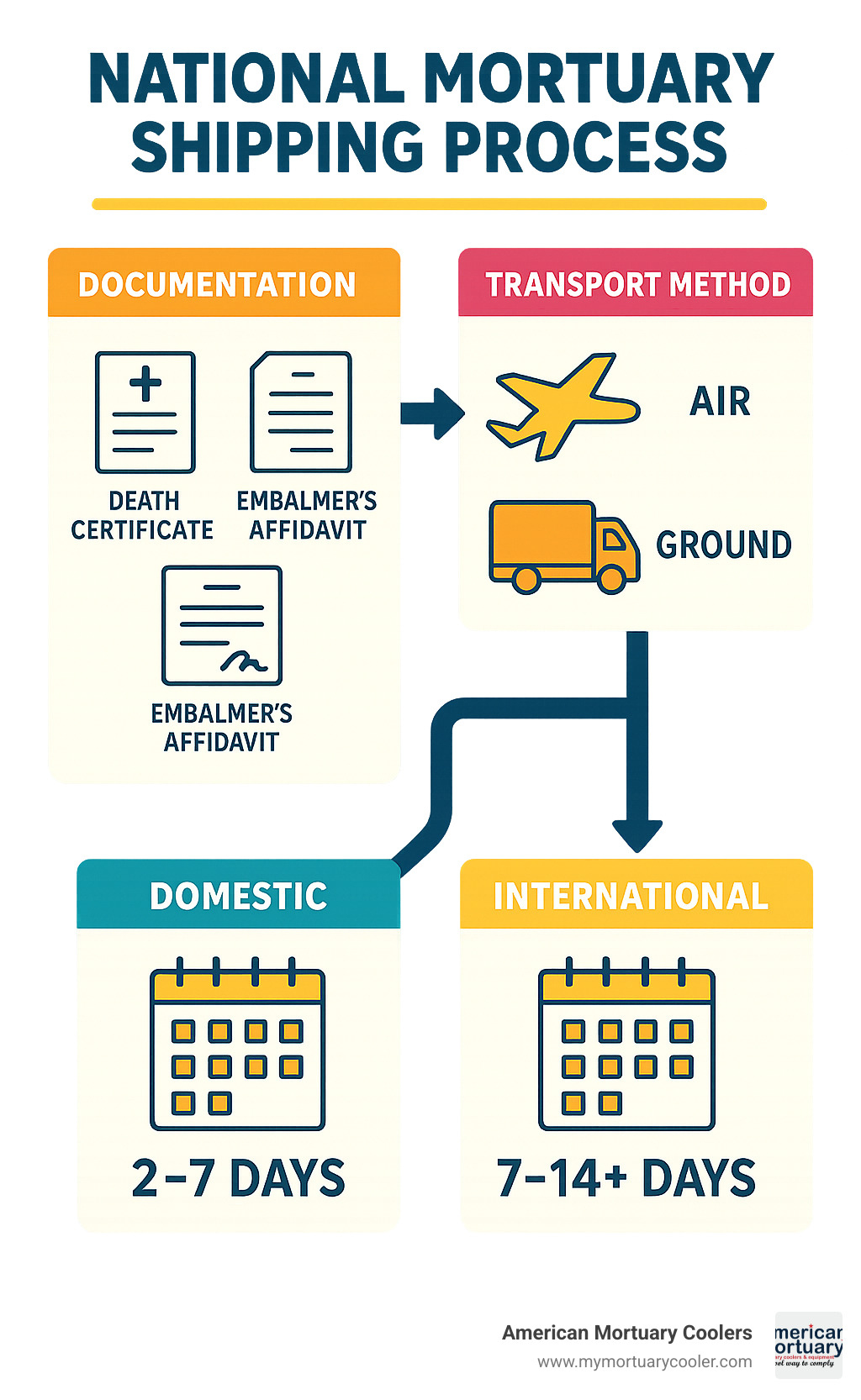
Basic national mortuary shipping vocab:
Understanding National Mortuary Shipping Basics
When a loved one passes away far from home, national mortuary shipping becomes an essential service that brings families comfort during difficult times. Behind the scenes, this specialized transport operates within a framework of federal regulations, state laws, and airline policies that have become more structured since the TSA implemented its "known shipper" program back in 2004.
Funeral directors are the unsung heroes in this process. They take the lead in coordinating these delicate arrangements, serving as the compassionate bridge between grieving families, airlines, and receiving funeral homes. Their expertise guides the chain of custody that ensures your loved one is handled with dignity and arrives safely at their final destination.
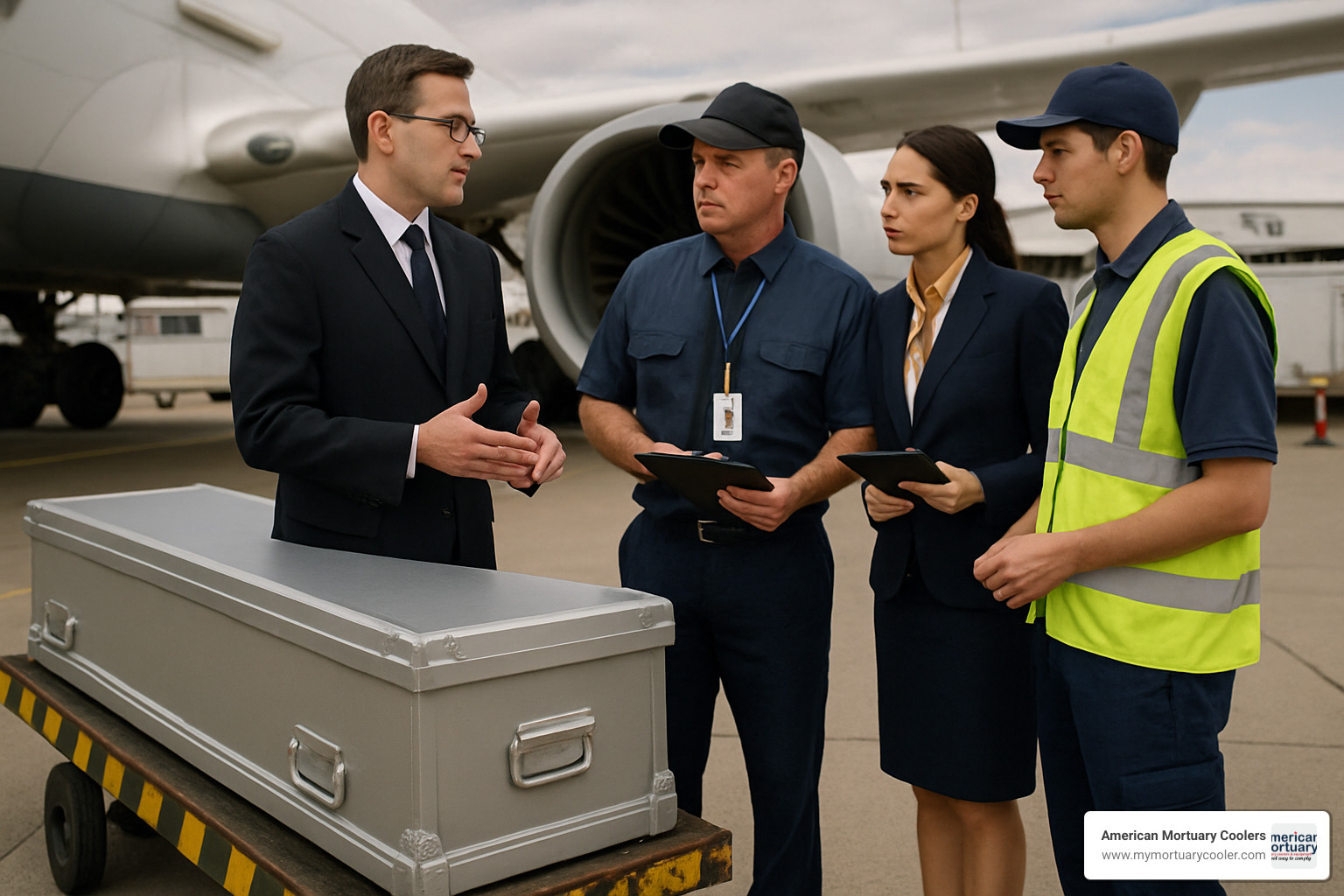
What "National Mortuary Shipping" Really Means
National mortuary shipping is much more than just transportation. It's a compassionate service network that helps bring loved ones home across state lines or international borders. This caring industry never sleeps, with companies like National Mortuary Shipping & Cremation (NMS) maintaining worldwide representative networks ready to help at a moment's notice.
The scope of these services varies based on your needs:
When moving between states, you'll need burial transit permits to cross state lines. For international situations, bringing a loved one home often requires careful embassy coordination. What's remarkable is that major providers can arrange transport from virtually anywhere in the world, no matter how remote.
Florida Mortuary Services, drawing on over 40 years of experience, has found that these specialized shipping providers have developed systems that not only provide peace of mind but often save families money compared to funeral homes trying to arrange shipping on their own.
Key Players Who Arrange Transport
The national mortuary shipping process brings together several caring professionals:
Families start the journey by reaching out to their trusted funeral home. Your hometown funeral director then becomes your advocate, working with shipping specialists and receiving facilities. Removal services compassionately secure your loved one from their place of passing to a preparation location. Carrier airlines, which require known shipper status, provide the actual transport. Finally, receiving funeral homes welcome and care for your loved one at the destination.
The coordination between these caring professionals is especially vital during time-sensitive situations. That's why services like NMS offer 24/7 first call apps that provide immediate assistance when a death occurs away from home, helping families steer those first overwhelming hours.
Budget Tips for National Mortuary Shipping
Finding affordable national mortuary shipping options doesn't mean compromising on dignity or care. Here are some thoughtful ways to manage costs:
Whenever possible, researching options before they're needed can lead to significant savings. Funeral homes with established airline relationships often receive better rates they can pass along to you. Many mortuary shipping specialists have negotiated volume discounts with airlines that benefit families.
Working with companies that handle multiple aspects of the process—from removal to preparation to shipping—often costs less than piecing together separate services. And when timing allows, avoiding holiday periods when airlines implement embargoes can prevent costly rush fees.
At American Mortuary Coolers, we've seen how proper temperature control during transport can also reduce costs by sometimes eliminating the need for expensive embalming, particularly for shorter journeys between neighboring states.
For those seeking more detailed information about the regulations and best practices in shipping remains, the National Funeral Directors Association provides excellent resources based on scientific research and industry standards.
Step-by-Step Guide to Budget-Friendly Mortuary Transport
Navigating the complexities of national mortuary shipping while keeping costs manageable doesn't have to be overwhelming. Let me walk you through the process from initial paperwork to final transport decisions – all with an eye on your budget.

Documentation & Legal Requirements
When it comes to paperwork for national mortuary shipping, there's simply no cutting corners. Missing documents can lead to heartbreaking delays and unexpected expenses for families already going through a difficult time.
Every shipment requires a death certificate that officially states cause and time of death. You'll also need a burial/transit permit issued by the state giving permission for transport. If the remains have been embalmed, an embalmer's affidavit certifies proper preparation. For added safety, a non-contagious disease letter confirms the death wasn't caused by a communicable illness. International shipments also require the deceased's passport.
Here's a money-saving tip we share with funeral directors: order multiple certified death certificate copies upfront. Additional copies requested later often come with premium fees. Also, double-check document requirements with the destination location before shipping – requirements vary, and finding you need additional paperwork mid-transport can be costly. When possible, use digital transmission to speed things along.
Becoming a TSA "Known Shipper"
Since 2004, funeral homes need to be registered as "known shippers" with the Transportation Security Administration before they can ship human remains as air cargo. It's not optional for national mortuary shipping by air, but the process is straightforward:
Reach out directly to each air cargo carrier you plan to use. They'll guide you through their application process, which might include a facility inspection. Yes, there are inspection fees that vary by airline, and you'll need to maintain ongoing compliance with security requirements.
While this process requires some upfront investment, the long-term savings make it worthwhile. The National Funeral Directors Association notes that most C corporations already appear in TSA's database, which can simplify things considerably.
For smaller funeral homes that only occasionally need shipping services, there's a budget-friendly alternative: partner with established shipping companies like NMS. This gives you access to their known shipper status without maintaining your own – a smart way to keep overhead low.
Coordinating Domestic vs International Moves
When planning national mortuary shipping, the difference between domestic and international transport is night and day – both in complexity and cost.
Domestic shipping requires state-specific burial transit permits, airline documentation, and TSA known shipper status. These requirements are manageable with some advance planning.
International shipping, however, takes everything to another level. Beyond all domestic requirements, you'll need consular clearance from the destination country, apostille certification on legal documents, potentially translated paperwork, and customs clearance arrangements. The coordination can be daunting, and costs typically run 2-3 times higher than domestic shipping.
One budget-conscious approach we've seen work well is partnering with companies that have established international networks. NMS, for example, has representatives worldwide who understand local requirements and can help avoid expensive mistakes.
| Transport Method | Average Cost | Transit Time | Best For |
|---|---|---|---|
| Air Transport | $1,500-$3,000 | 1-2 days | Long distances |
| Ground Transport | $1.50-$3.00 per mile | 1-3 days per 1,000 miles | Regional transport |
| Combined Methods | Varies | 2-5 days | Budget-conscious families |
Common Challenges in National Mortuary Shipping
Even with careful planning, national mortuary shipping can hit unexpected bumps along the way. Flight delays and cancellations happen – whether from weather or mechanical issues. Many families don't realize that airlines often restrict shipping human remains during holiday periods (called "embargoes"), which can throw off carefully made plans.
International shipping brings additional challenges like language barriers that may require translation services. Even small documentation errors can cause major delays, and unexpected weight surcharges can appear for larger cases.
At American Mortuary Coolers, we've helped funeral directors overcome many of these challenges with proper refrigeration solutions. Our custom coolers are designed to maintain appropriate temperatures for extended periods, giving you flexibility when shipping plans change unexpectedly. This extra time buffer has saved countless families from additional stress when flights are delayed or rescheduled – and often prevents additional costs too.
Choosing Providers & Leveraging Technology
Picking the right national mortuary shipping partner isn't just about price—it's about finding someone who'll treat your loved one with dignity while navigating complex logistics. Companies like National Mortuary Shipping & Cremation (NMS) and Florida Mortuary Services bring over four decades of experience to the table, with worldwide networks that can make a difficult process much smoother.
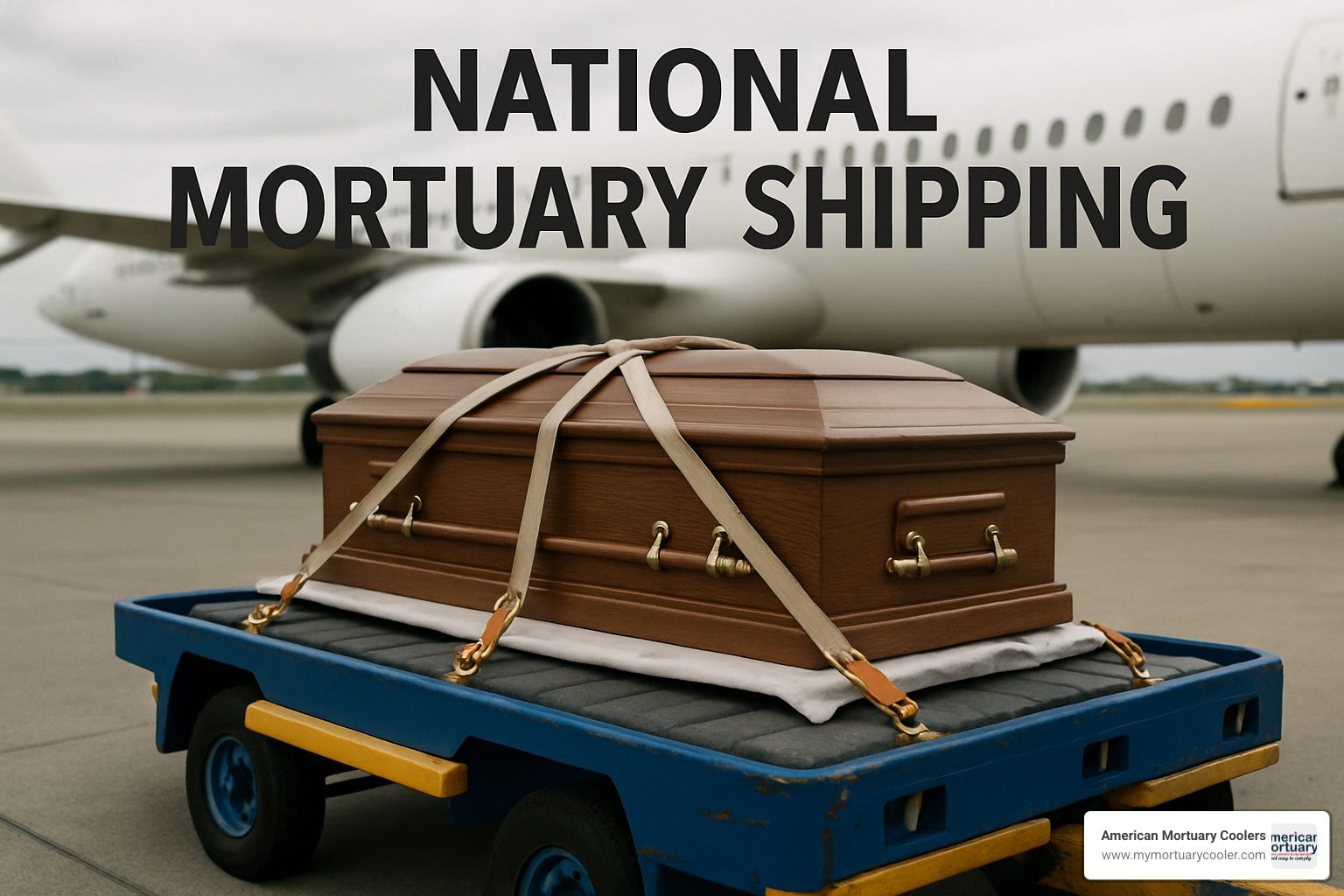
When you're evaluating who to trust with this sensitive task, think about the human factors behind the service. How long have they been helping families? Those decades of experience mean they've likely solved every challenge imaginable. Where can they reach? A provider with global connections becomes invaluable for international transport. Can you reach them at 3 AM? Because grief doesn't check the clock before arriving. Do they accept helpful technology? Digital tracking can provide tremendous peace of mind. And finally, are their prices straightforward? The last thing you need during mourning is surprise fees.
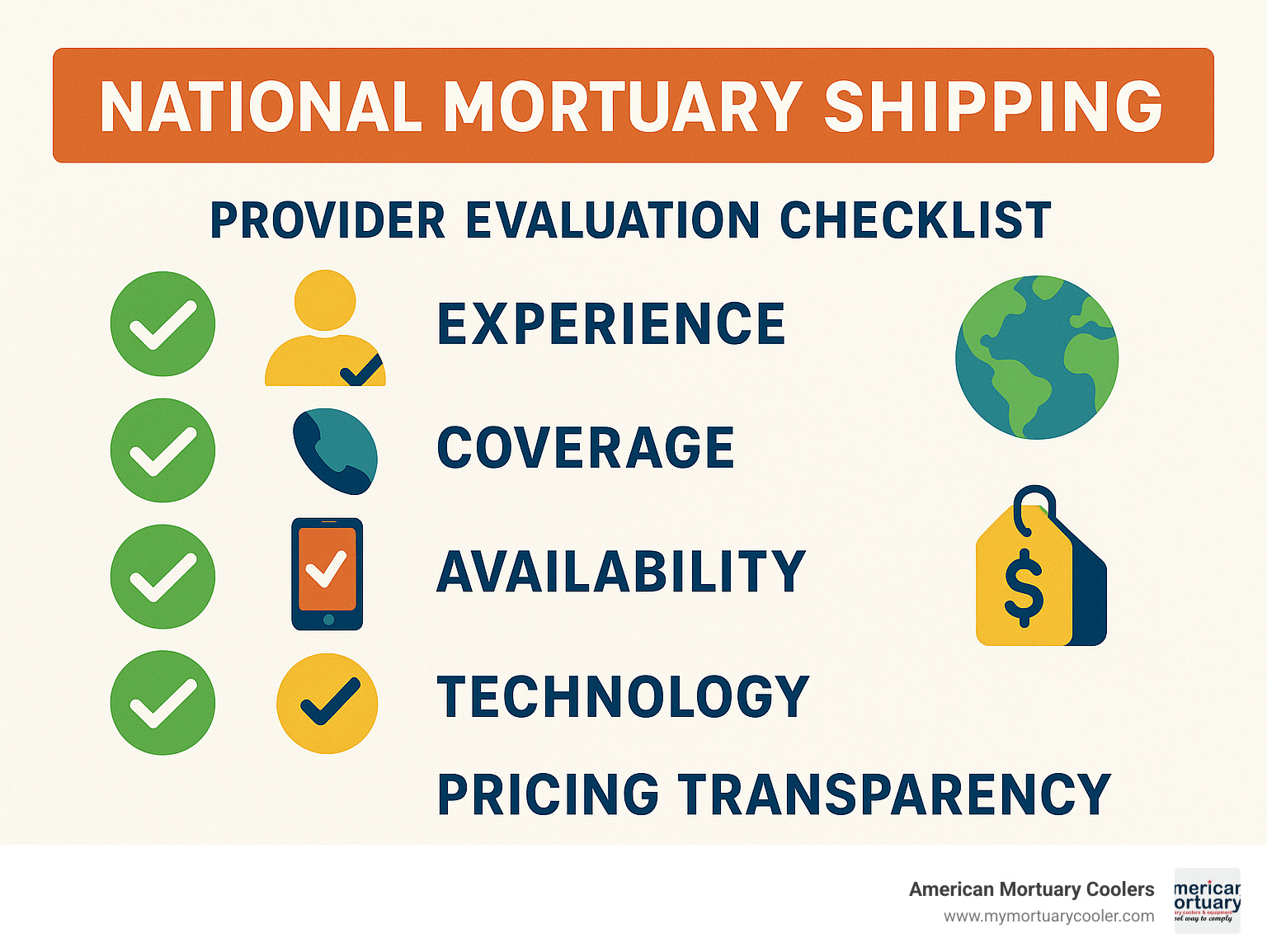
How Funeral Homes Work Together
There's something beautiful about how funeral homes collaborate across distances to bring loved ones home. This partnership dance begins with the first-call handoff, where the initial funeral home reaches out to colleagues at the destination. They have heartfelt conversations about service coordination, dividing responsibilities with clear timelines that honor both family wishes and practical realities.
The logistics continue with livery services — the dignified transportation between airports and funeral facilities. Meanwhile, professionals handle embalming quality control, ensuring preparation meets both shipping requirements and destination standards. Throughout this journey, funeral directors maintain real-time updates, keeping families informed during an emotionally challenging time.
This teamwork approach saves money too. Why ship a casket across the country when the receiving funeral home might offer the perfect option locally? These partnerships prevent duplicated efforts while ensuring your loved one receives consistent, respectful care from departure to arrival.
Tech Tools That Cut Costs & Stress
The funeral industry might seem traditional, but modern technology has transformed national mortuary shipping in ways that bring comfort to grieving families while easing financial burdens.
Today's funeral directors can access mobile dispatch apps that streamline arrangements with a few taps. Companies like NMS offer 24/7 first call applications that put help literally at your fingertips. Digital documentation has largely replaced paper shuffling, meaning permits and certificates move at internet speed rather than mail pace.
For families concerned about preservation during transit, temperature-monitoring devices now provide real-time condition tracking for unembalmed remains. Wondering where your loved one's flight is? Live flight tracking offers instant updates rather than anxious waiting. Even payment has become simpler through online portals that handle transactions securely and transparently.
These tech advances particularly benefit budget-conscious families. Digital documents prevent costly delays from paperwork mistakes. Temperature monitoring might allow for refrigeration instead of more expensive embalming in certain situations. Each technological improvement represents not just convenience, but potentially significant savings during an already difficult time.
More Info About International Shipping Coolers
When it comes to international national mortuary shipping, temperature control isn't just recommended—it's often required by law. At American Mortuary Coolers, we understand this critical need and have developed solutions that balance regulatory compliance with family budgets.
Our cooler rental programs offer short-term options that make financial sense for one-time needs. For situations requiring more mobility, our roll-in units provide portable cooling that can accompany remains throughout the entire transport journey. We've even engineered specialized international units designed specifically to handle varying voltage requirements across different countries.
The mortuary coolers we craft are built Tennessee-tough to withstand international shipping challenges while maintaining precise temperature control. This becomes especially important when facing unexpected customs delays that can extend transit times beyond initial estimates.
Different journeys require different cooling approaches. Brief transits of 1-3 days might work with simple cooling packs, while medium journeys (3-7 days) typically need active refrigeration. For extended international transports lasting over a week, specialized systems with backup power become essential safeguards.
By understanding these requirements before shipping begins, funeral directors can select the most affordable cooling solution while ensuring their clients' loved ones arrive with dignity and in compliance with all destination requirements. Learn more about our International Shipping Coolers designed specifically for these challenging journeys.
Special Situations: Un-Embalmed, Cremated, Oversized & Bariatric Remains
When it comes to national mortuary shipping, not every situation follows the standard playbook. Some cases require special handling, creative solutions, and a deeper understanding of regulations – especially when dealing with remains that don't fit typical shipping parameters.
Shipping Cremated Remains on a Budget
Let's face it – shipping cremated remains is typically the gentlest option for your wallet when considering national mortuary shipping. Families often find relief not just emotionally, but financially too.
The United States Postal Service has become the go-to option for many families. USPS Priority Mail Express is actually the only carrier legally authorized to deliver cremated remains directly to homes or businesses. The service requires Label 139 – a bright orange sticker that clearly identifies the package contents, ensuring proper handling throughout its journey.
Many people don't realize they can also personally transport their loved one's ashes as airline carry-on items. Before choosing this route, though, it's wise to check your specific airline's policies, as requirements can vary.
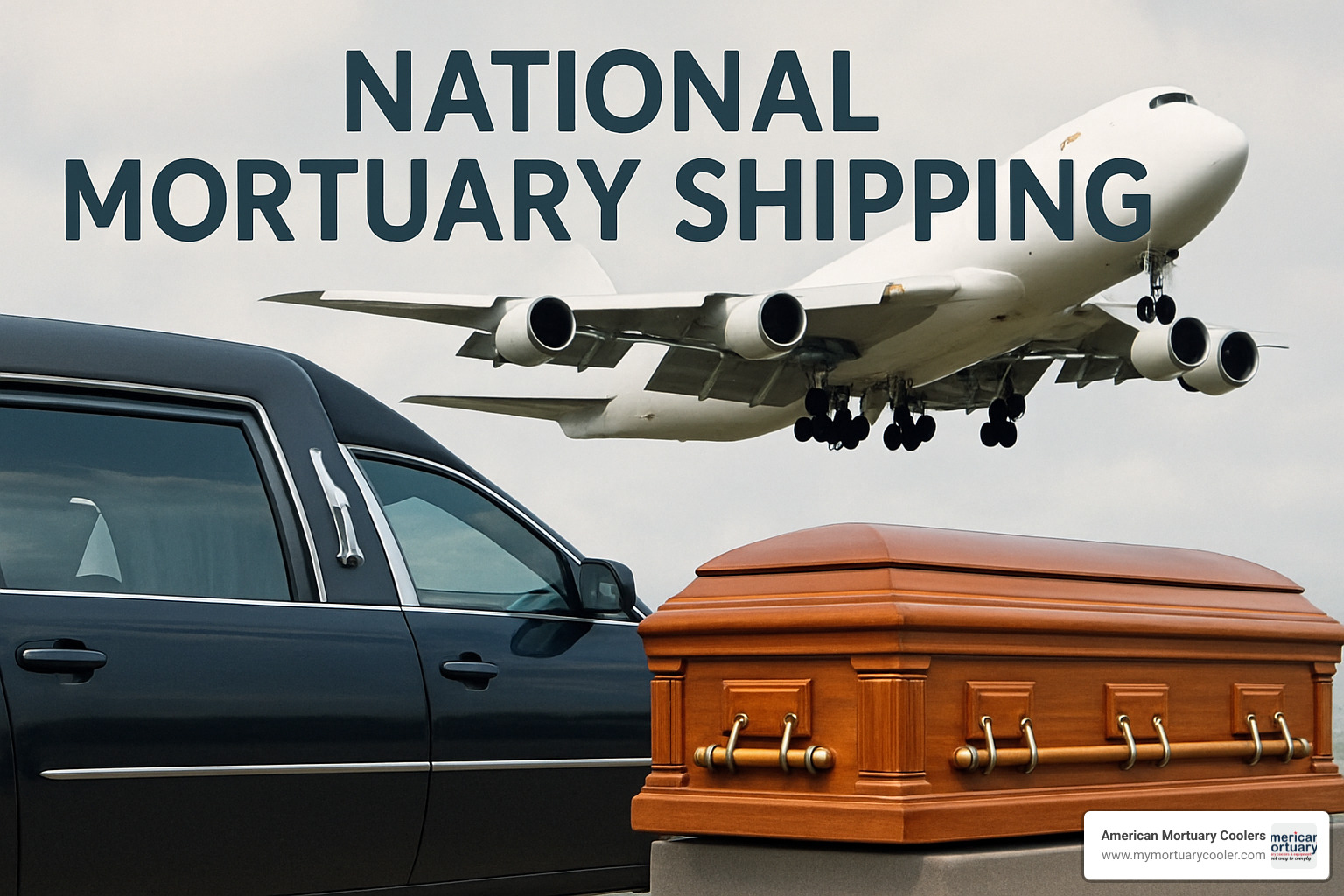
The USPS offers specialized kits specifically designed for shipping cremated remains that include appropriate packaging, labels, and tracking features. At just $25-$50, these kits represent significant savings compared to shipping uncremated remains, which can run into thousands.
If you're looking to trim costs even further, consider selecting lightweight urns for shipping (reducing postage costs), using USPS flat-rate shipping when possible, or even using temporary containers for transit before transferring to permanent urns at the final destination.
Handling Un-Embalmed & Oversized Cases
When dealing with un-embalmed remains, time becomes your most precious commodity in national mortuary shipping. Typically, you're working within a tight 24-72 hour window from the time of death. This situation demands constant temperature monitoring, specialized leak-proof body pouches, and careful management of dry ice (which airlines strictly regulate for safety reasons).
The challenges multiply when handling oversized or bariatric remains. Weight surcharges can increase your shipping costs by 50-100% – a significant consideration for families already managing funeral expenses. These situations require reinforced combo/air trays designed to safely support additional weight, more handlers to manage the transfer process, and sometimes even freight shipping arrangements instead of passenger aircraft.
At American Mortuary Coolers, we've seen these challenges and developed specialized bariatric cooling solutions that accommodate larger individuals while maintaining proper temperature during transport. Our portable cooling systems maintain the ideal 35-40°F range that preserves remains during shipping. This technology has helped many families choose more affordable non-embalming options while still meeting all shipping regulations.
The right equipment makes all the difference in these special situations. Our custom-designed cooling units can actually extend viable transport time without embalming – particularly valuable when coordinating specialized transport for oversized remains or when flights face unexpected delays. For families navigating the already difficult journey of returning a loved one home, having reliable temperature control provides both peace of mind and practical financial benefits.
For un-embalmed shipping, proper refrigeration isn't just recommended – it's essential. Our mortuary coolers are built specifically to withstand the rigors of national mortuary shipping while providing the consistent cooling needed to preserve dignity and comply with health regulations across state lines.
Frequently Asked Questions about National Mortuary Shipping
How much does national mortuary shipping cost on average?
When families ask about national mortuary shipping costs, I always explain that prices vary widely based on several factors. For domestic air shipping, you're typically looking at $1,000-$3,000, which covers airline fees, the shipping container, and all required documentation. International shipping costs substantially more—anywhere from $3,000 to $10,000+, depending on the destination country.
If you're considering ground transport, expect to pay roughly $1.50-$3.00 per mile. For families choosing cremation first, shipping becomes much more affordable, with USPS Priority Mail Express options ranging from just $25-$150.
Weight plays a significant role in pricing—heavier remains and containers naturally cost more to transport. Distance, urgency, and any special handling requirements will also impact your final bill. And just like airline tickets for travelers, prices often surge during holiday periods when capacity is limited.
Here's a budget-friendly tip I've learned from years in the industry: Companies like National Mortuary Shipping & Cremation often secure better airline rates through their volume discounts than you'd get arranging shipping independently. It's worth checking their rates even if you're working with a local funeral home.
Can families arrange shipping without a funeral director?
I'm often asked if families can handle national mortuary shipping themselves to save money. While I understand the desire to reduce costs during an already difficult time, the reality is that arranging shipping without a funeral director creates significant problems.
Most airlines will only accept human remains from TSA "known shippers"—a designation typically held by funeral homes, not individuals. The documentation requirements are incredibly complex and vary by state and country. Plus, proper preparation of remains requires professional facilities for either embalming or refrigeration.
The one exception is shipping cremated remains, which families can arrange directly through USPS using their specialized kits and Label 139 identification system.
For budget-conscious families, I recommend a more practical approach: work with a hometown funeral director for coordination, but be proactive about requesting itemized pricing and exploring cost-saving options. Consider cremation before shipping when appropriate, and don't hesitate to compare quotes from multiple shipping providers. This approach balances cost savings with peace of mind.
What happens if paperwork is incomplete at the airport?
Documentation problems during national mortuary shipping can create heartbreaking delays and unexpected expenses. When paperwork issues arise at the airport, remains are typically held at the origin airport until all documentation is corrected—often incurring storage fees of $100-$300 daily.
You'll need to make new flight arrangements, frequently at premium last-minute rates. In international cases, the situation can become even more complicated, sometimes resulting in remains being returned to the origin country altogether.
To avoid these costly complications, I always recommend double-checking all documentation against both origin and destination requirements before shipping day. Keep digital copies of everything readily accessible, and ensure 24/7 contact information travels with the shipment. Working with experienced shipping specialists who can troubleshoot documentation issues in real-time can be invaluable.
At American Mortuary Coolers, we've seen how proper refrigeration provides precious extra time to resolve documentation issues without compromising the condition of the remains. Our cooling solutions have helped many families avoid thousands in emergency shipping arrangements when paperwork snags occur.
The most common documentation errors include missing signatures, improper seals on certificates, and incomplete transit permits. Taking extra time to verify these details before shipping can save families both money and emotional distress during an already difficult time.
Conclusion & Budget-Smart Next Steps
Let's face it – saying goodbye to a loved one is hard enough without worrying about the logistics and costs of bringing them home. Throughout this guide, we've walked through the ins and outs of national mortuary shipping, and now it's time to put it all together with some practical next steps.
The good news? With some knowledge and planning, you can steer this process with both dignity and financial wisdom.
When it comes to managing costs while ensuring respectful transport, remember these essentials: compare multiple shipping providers before deciding, consider cremation prior to shipping when it aligns with family wishes, and leverage modern technology to keep paperwork flowing smoothly. Understanding how proper refrigeration impacts your shipping options can open up more affordable alternatives to traditional embalming in many cases.
Perhaps most importantly, whenever possible, try to plan ahead. Those rush charges and emergency fees can add up quickly when arrangements are made under intense time pressure.
At American Mortuary Coolers, we understand the challenges funeral directors face when coordinating national mortuary shipping. That's why we've developed durable, custom mortuary coolers specifically designed to maintain proper temperature control throughout the transport process. Our Tennessee-based team delivers directly to funeral homes across the lower 48 states, ensuring that quality refrigeration is accessible no matter where you're located.
We've thoughtfully engineered our cooling solutions with shipping scenarios in mind – whether you need temporary storage before air transport or are facilitating multi-state ground shipping. With regional representatives scattered across the Midwest, Northeast, Rocky Mountains, Southeast, Southwest, and Pacific regions, we bring local understanding to national shipping challenges.
The right cooling equipment can make all the difference in providing families with more options and often more affordable alternatives. Our custom-built units help funeral homes extend viable transport windows, potentially avoiding costly rush shipping while maintaining the highest standards of care.
For more information about how our cooling solutions can support your national mortuary shipping needs, visit our one-stop cooler shop or reach out to our team directly. We're real people who understand what you're going through, and we're here to help you provide dignified, cost-effective services during life's most challenging moments.
After all, bringing loved ones home shouldn't have to break the bank – and with the right knowledge and resources, it doesn't have to.



















